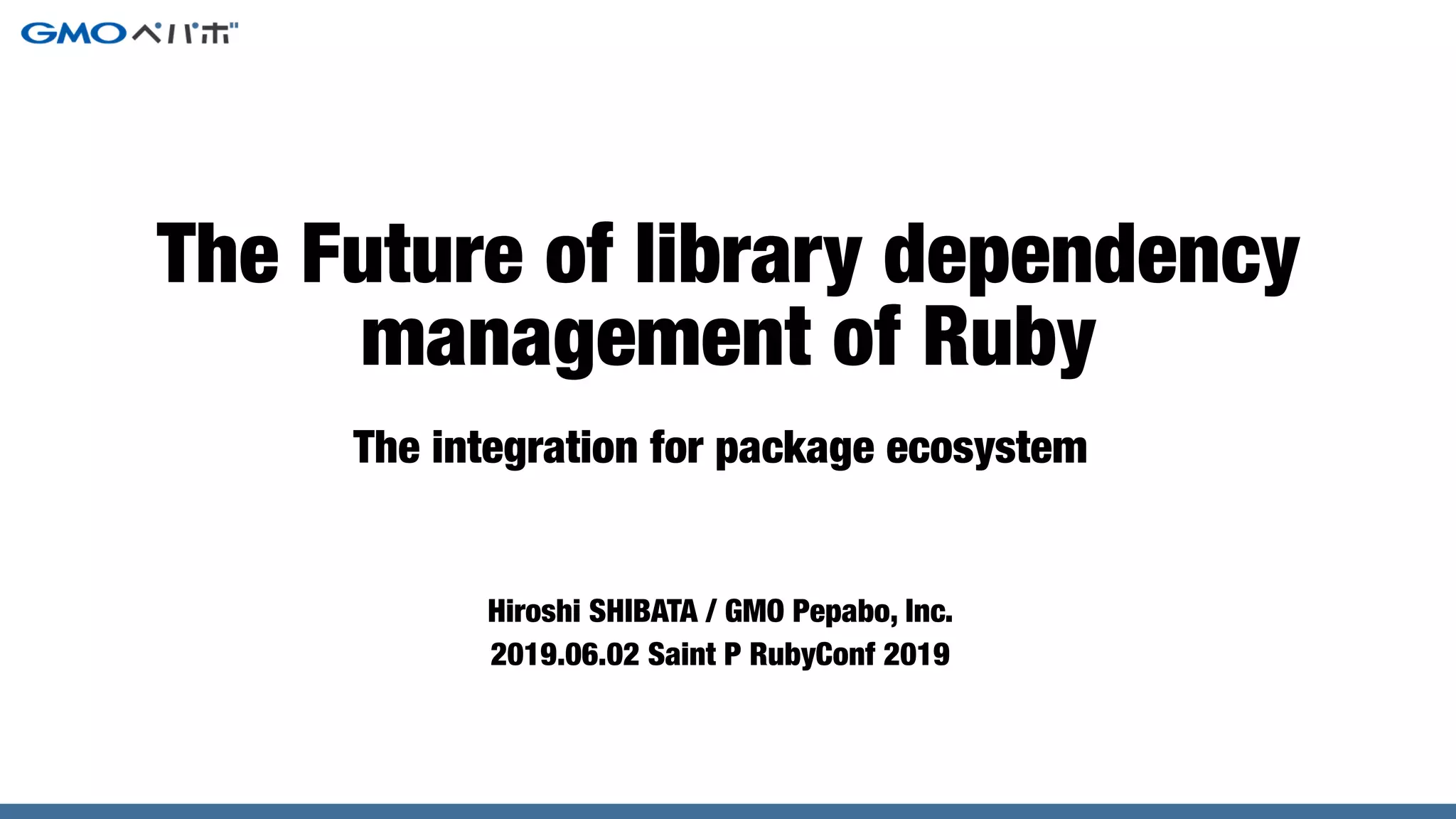The document discusses integrating the Bundler dependency manager into the Ruby programming language core. It covers the benefits of integrating Bundler, such as allowing developers to manage library dependencies directly within Ruby projects. It also discusses challenges faced in integrating Bundler, like ensuring Bundler test suites work properly within the Ruby core codebase. The author details steps taken to start merging Bundler code into Ruby, including adding a "make test-bundler" command to run Bundler tests during development.





![self.introduce
=> {
name: “SHIBATA Hiroshi”,
nickname: “hsbt”,
organizations: [“ruby”, “rubygems”, “asakusarb”, “pepabo”, …],
commit_bits: [“ruby”, “rake”, “rubygems”, “bundler”, “rdoc”,
“psych”, “ruby-build”, “railsgirls”, “railsgirls-jp”, …],
sites: [“hsbt.org”, “ruby-lang.org”, “rubyci.org”, “railsgirls.com”,
“railsgirls.jp”],
}](https://image.slidesharecdn.com/20190602-saintprubyconf-2019-190606131109/85/The-Future-of-Dependency-Management-for-Ruby-6-320.jpg)











![Inside Default gems
• The ruby core team can release default gems to the
rubygems.org. You can install them via RubyGems.
• Rubygems have a detection method for default gems.
• Default gems are openssl, psych, json, etc…
>> Gem.loaded_specs["did_you_mean"].default_gem?
=> false
>> require 'openssl'
=> true
>> Gem.loaded_specs["openssl"].default_gem?
=> true](https://image.slidesharecdn.com/20190602-saintprubyconf-2019-190606131109/85/The-Future-of-Dependency-Management-for-Ruby-18-320.jpg)







![Remove deprecated code
• RubyGems have a lot of workarounds for old Ruby. They are
branches like RUBY_VERSION, respond_to?, defined?
- if [].respond_to? :flat_map
- def pinned_requirement name # :nodoc:
- requirement = Gem::Dependency.new name
- specification = @set.sets.flat_map { |set|
- set.find_all(requirement)
- }.compact.first
+ def pinned_requirement name # :nodoc:
+ requirement = Gem::Dependency.new name](https://image.slidesharecdn.com/20190602-saintprubyconf-2019-190606131109/85/The-Future-of-Dependency-Management-for-Ruby-26-320.jpg)







![The location of execution wrapper
• Ruby core put executable file directly under the bin directory.
• We often faced conflict error when upgrading rdoc.
• When You put ‘y’, You completely lost original executable.
~ > gem update rdoc
Updating installed gems
Updating rdoc
Fetching: rdoc-6.0.4.gem (100%)
rdoc's executable "rdoc" conflicts with /Users/hsbt/.rbenv/versions/2.3.7/bin/rdoc
Overwrite the executable? [yN] y
rdoc's executable "ri" conflicts with /Users/hsbt/.rbenv/versions/2.3.7/bin/ri
Overwrite the executable? [yN] y
Successfully installed rdoc-6.0.4
Gems updated: rdoc](https://image.slidesharecdn.com/20190602-saintprubyconf-2019-190606131109/85/The-Future-of-Dependency-Management-for-Ruby-34-320.jpg)






![Bundler Integration on RubyGems 2.7
• It disabled in Ruby
2.5 because
bundler is not part
of standard
library.
• You can enabled it
with only `gem
update --system`
if USE_BUNDLER_FOR_GEMDEPS
ENV["BUNDLE_GEMFILE"] ||= File.expand_path(path)
require 'rubygems/user_interaction'
Gem::DefaultUserInteraction.use_ui(ui) do
require "bundler"
@gemdeps = Bundler.setup
Bundler.ui = nil
@gemdeps.requested_specs.map(&:to_spec).sort_by(&:name)
end
else
rs = Gem::RequestSet.new
@gemdeps = rs.load_gemdeps path
rs.resolve_current.map do |s|
s.full_spec.tap(&:activate)
end
end](https://image.slidesharecdn.com/20190602-saintprubyconf-2019-190606131109/85/The-Future-of-Dependency-Management-for-Ruby-41-320.jpg)



![Update BundlerVersionFinder
•BundlerVersionFinder was
introduced at RubyGems 2.7
•It ability is the version detection
by RubyGems strictly. Ex. 1.17.3
matches only 1.17.3.
•We update the filter condition.
Now, 1.17.3 matches 1.x.y, 2.0.3
also matches 2.x.y.
def self.bundler_version_with_reason
if v = ENV["BUNDLER_VERSION"]
return [v, "`$BUNDLER_VERSION`"]
end
if v = bundle_update_bundler_version
return if v == true
return [v, "`bundle update --bundler`"]
end
v, lockfile = lockfile_version
if v
return [v, "your #{lockfile}"]
end
end](https://image.slidesharecdn.com/20190602-saintprubyconf-2019-190606131109/85/The-Future-of-Dependency-Management-for-Ruby-45-320.jpg)
![The bundler switcher issue of Heroku
•https://github.com/heroku/heroku-buildpack-ruby/pull/850
•Heroku platform only uses version 1 of Bundler like 1.17.x. But Bundler
version finder of RubyGems detects Bundler 1 or 2 from your Gemfile.lock.
@schneems fixes this issue on heroku.
•When You use Gemfile.lock updated by Bundler 2 with `bundle update --
bundler`, Heroku reject your app. Now you can use Ruby 2.6 and Bundler 2
on heroku.
BLESSED_BUNDLER_VERSIONS = {}
BLESSED_BUNDLER_VERSIONS["1"] = "1.15.2"
BLESSED_BUNDLER_VERSIONS["2"] = "2.0.1"](https://image.slidesharecdn.com/20190602-saintprubyconf-2019-190606131109/85/The-Future-of-Dependency-Management-for-Ruby-46-320.jpg)

























